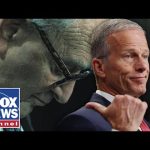The recent suspension of Jimmy Kimmel’s late-night show by ABC following his controversial comments about the assassination of conservative activist Charlie Kirk has sent shockwaves through the entertainment and political worlds. Kimmel’s remarks, which suggested the “MAGA gang” was trying to politicize the tragedy to their advantage, sparked intense backlash from conservatives and threats of regulatory action by Federal Communications Commission (FCC) Chairman Brendan Carr. This unprecedented move by a major broadcast network highlights the increasing blend of politics and entertainment, but raises serious concerns about freedom of speech and the role of late-night comedy.
Kimmel’s comments, delivered during his monologue, went beyond the realm of satire and veered into pointed political criticism against President Trump and his supporters. The resulting response from the FCC and ABC was swift and severe, with Kimmel taken off the air for six days. This action came amid pressure from the Trump administration and conservative watchdogs, with Carr publicly condemning Kimmel’s statements as misleading and dangerously partisan. While defenders have argued this is about accountability, many see this as a dangerous precedent of government and corporate censorship of dissenting voices in entertainment.
The incident also lays bare the evolving nature of late-night television, which over recent years has morphed from pure comedy into a battleground for political identity. Where once late-night hosts served as light-hearted entertainers and cultural commentators, shows now increasingly function as partisan platforms, often alienating broad swaths of the viewing public. Kimmel’s misstep underscores the risk of this transformation — audiences grow tired when political commentary overshadows genuine humor, potentially shrinking the late-night landscape to a narrow echo chamber.
ABC and its parent company Disney’s decision to suspend Kimmel was widely criticized as a capitulation to political pressure, raising alarms about corporate media’s role in policing speech to suit political climates. This suspension not only ignited debates about free speech but also spotlighted how major entertainment powerhouses may prioritize business and regulatory appeasement over their audience’s diverse perspectives. Moreover, the FCC chairman’s threats to revoke broadcast licenses raise serious constitutional questions about government overreach and regulatory bullying under the guise of maintaining decency standards.
As Kimmel returned to the airwaves, the damage to his credibility and the show’s reputation is evident, and this episode serves as a cautionary tale. The stark reality is that late-night comedy’s shift into partisan warfare alienates many Americans who just want entertainment without an agenda. Networks and hosts would do well to remember that America’s cultural fabric is diverse, and the survival of late-night entertainment depends on its ability to entertain all viewpoints, not just those of a vocal political faction. Otherwise, the punchlines may fall flat in a country increasingly weary of division masked as humor.




